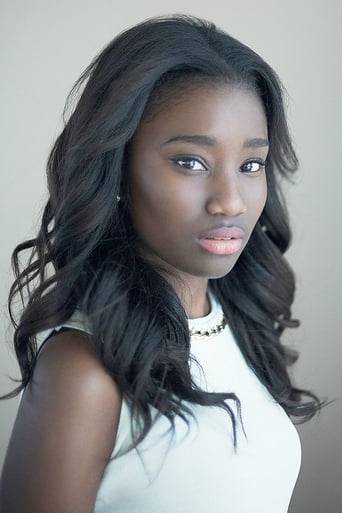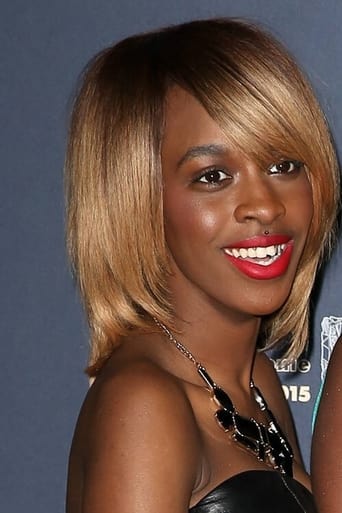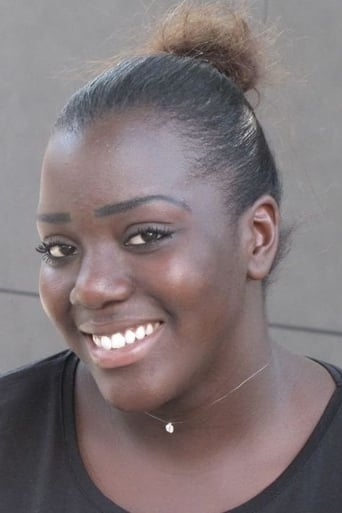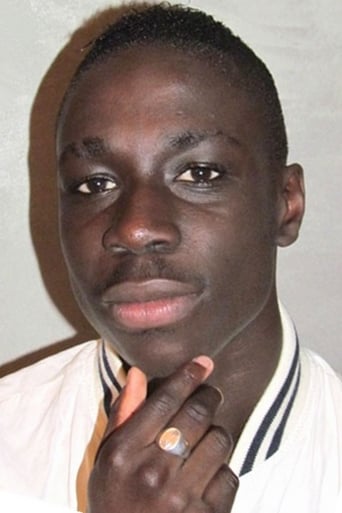Contentar
Best movie of this year hands down!
Kinley
This movie feels like it was made purely to piss off people who want good shows
Logan
By the time the dramatic fireworks start popping off, each one feels earned.
paul2001sw-1
All-girl "gangs" may offer female teenagers a safe space to experiment with the trappings of womanhood - a step-up from childhood, but a transitional stage nonetheless. This social dynamic is explored in 'Girlhood', but against the backdrop of an impoverished, ethnic minority community in Paris, where every choice made has wider repercussions for life. Unfortunately, the film feels disjointed, in part because it doesn't seem to know whether it wants to celebrate this "girlhood", or look on aghast; of course real life isn't black and white, but the film seems to alternate between portraying these two extremes, instead of managing to paint a subtler shade. Beyond the fact that life's hard and people (and especially men) are hard as well, I didn't take too much away from this film.
sojournerinmind
I was deeply moved by one scene in this film - the "Diamonds" dance scene between the bande de filles - that I felt really made this movie, an acceptable offering, something special. I was nearly in tears. Here you have these girls from an impoverished area, left to their own devices and self-defense in a rough and tumble world that has zero positive expectations for them. All they have is each other to make them feel of value. Stealing tight dresses from the mall and dancing together to a song that would have them feel beautiful in a society that has them feeling anything but. Really poignant what the director created there. I felt more could have been done with the film. The second half failed the first, in my opinion. But the characters were multi-faceted, the acting and dialogue were realistic. I hope to see more films like this.
rogerdarlington
In 2014, two films with similar titles were released: "Boyhood" and "Girlhood". But they were very different. The first was an American movie, shot over 12 years, with an all- white cast. The second was a French work with a narrative of a few months and a cast almost wholly black. "Girlhood" - which was called "Bande De Filles" in the original French - tells the story of 16 year old Marieme (a remarkable showing by young Karidja Touré) who joins a gang of three other girls in an effort to find some status, only to discover that this is not the life she seeks. Like "Boyhood", there is no real resolution but simply a coming of age. Céline Sciamma - herself white - both wrote and directed this original view of what it means to be young, uneducated and black in France.
FrostyChud
Be warned: BANDE DE FILLES is not a realist drama about the struggles of young women of color in the hardscrabble French ghetto. It is the creepy erotic fantasy of a middle-aged white lesbian."Celine Sciamma must be a homosexual," I deduced as I left the theater, proud of myself for penetrating the mystery of BANDE DE FILLES. A quick Google search confirmed my intuition. How did I know? First of all, every man in the movie save one is a violent psychopath. The single exception to this rule is a simple idiotic chauvinist. Now, this is not a criticism as such. I am sure that the men who live in Marieme's projects are quite as bad as Sciamma portrays them to be. However, it is clear that in Sciamma's libidinal economy, men are by definition psychopaths, which does not amount to the same thing. Second of all, the film ends with the main character becoming a butch pre-lesbian complete with short haircut and bound breasts. Huh? Nothing prepares us for this development. The director clearly wants us to raise our fist and cheer for Marieme when, in the last scene, she bravely chooses an uncertain Elsewhere over the oppressive environment she grew up in. But I know where Sciamma sends her when she walks out of the frame: straight to her bed. Now, there is nothing wrong with filming one's fantasy and filming it dirty at that. Sciamma's bad faith lies in the way she hides it under an unconvincing pseudo-political drama. Had she filmed a straight exploitation movie I would have been the first to award it ten stars, but I hate Beautiful Soul hypocrisy and ideology. The director's creepiness is double. The actresses have no idea that the unrealistic drama Sciamma has written for them is nothing but a pretext to perv on the otherness of their black bodies. Watching the film, we sense that this act of subtle deception perpetrated on the actresses by the director is a necessary ingredient in Sciamma's perverse scenario. Not only is she getting off on their otherness, she is getting off their ignorance of what is really going on. How is this different from what Hitchcock does? After all, his greatest movies are all perverse fantasies of possession hidden within the socially acceptable form of the thriller. The crucial difference lies in the fact that Hitchcock never claimed, implicitly or explicitly, that he was helping anybody, that he was an agent of Good, or that he was giving a voice to the disenfranchised. He told us loud and clear: I am dangerous. I am not to be trusted. Enter my fantasies at your own risk. Back to BANDE DE FILLES. Every few minutes the dialogue stops and Sciamma treats us to an extended music clip during which the exotic black proles undulate poetically and emote into the void. These are the money shots that are supposed to give the film an allure of artistic integrity. All they do is shore up the idiocy and meaningless of the actions of the four main characters. What is pornography? It is the attempt to render visible something that is radically invisible, namely sex. More precisely, it is the mystery of feminine interiority that pornography betrays by purporting to show it. The fact that Sciamma is a woman does not make her attempt to show what cannot be shown any more legitimate. We all become idiots when we attempt to depict feminine jouissance.Visually, the film is difficult to watch because of the constant close-ups. They create a claustrophobic effect that renders directly Sciamma's desire to possess her characters. Her camera is glued to their skin, incessantly and pervily traveling up and down their bodies. The fight scenes, each of which ends with a black teenage girl being beaten, stripped, and humiliated in front of a frothing crowd, form the true center of the movie. Here is where Sciamma's slip shows. We can sense her licking her lips and getting excited as she films these girls clawing at each other like enraged pit bulls. Rather than focusing on the standard fixed body parts as the perverse male gaze would, the perverse female gaze treats every inch of these girls as an erogenous zone. The resulting absence of a fixed point of view elegantly materializes Sciamma's refusal of the phallic order and its pretension to objectivity. But here lies also the problem. From a social point of view, there is nothing here but domination, submission, and misery. No one has anything but the most regressive and impoverished relationship with language and Logos, and we sense that Sciamma likes it that way. A few of the characters attempt to navigate through this fog of perversion towards something resembling morality, but with no outside support, all they can do is fumble. The long and the short of it is that Celine Sciamma, rather than denouncing the gratuitous misery and violence of French ghetto culture -- the only acceptable ethical stance -- gets off on it. Verdict: one more sanctimonious white ideologue using minorities for her own perverse agenda.












